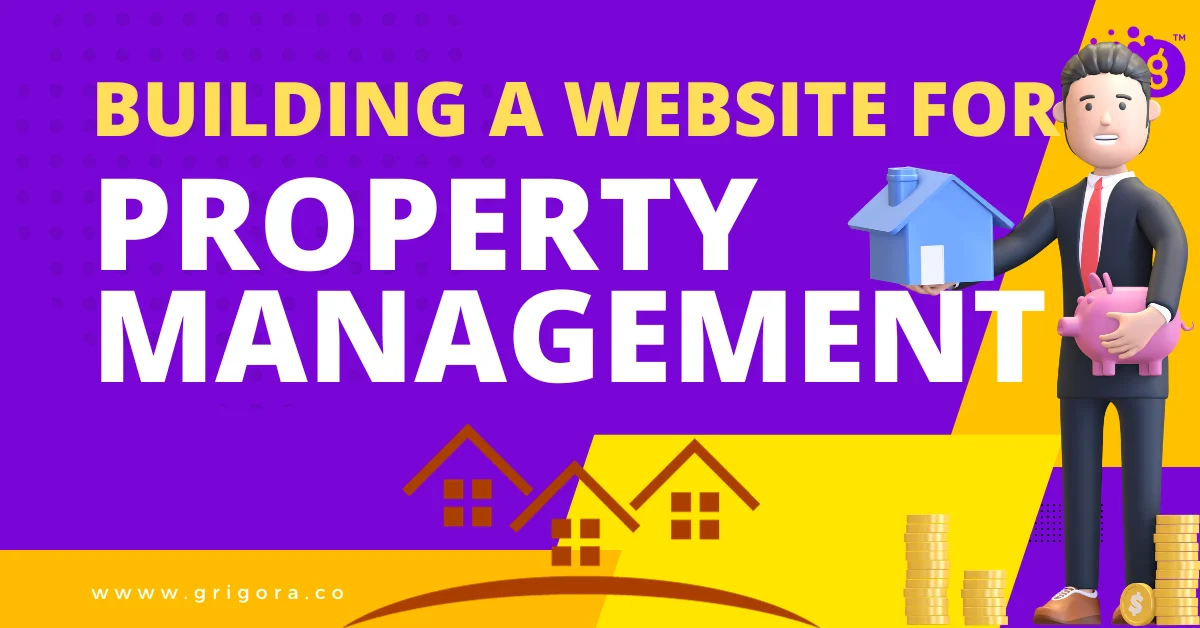Introduction
"In today's digital age, your online presence is your business card." This quote encapsulates why a property management website is no longer a luxury but a necessity.
The Growing Importance of Digital Presence in Property Management
In the past, property management companies relied heavily on traditional methods of advertising and client engagement, such as print ads, billboards, and word-of-mouth referrals. However, the landscape has dramatically changed with the advent of the internet and social media. Today, a digital presence is not just an option; it's a requirement for business survival.
Having a website allows you to showcase your properties to a global audience 24/7, offering a level of exposure that traditional methods can't match. It also positions your business as more professional and trustworthy. In a competitive market, lacking a website can severely limit your growth opportunities and give the edge to competitors who have adapted to the digital age.
Why a Property Management Website is Essential in Today's Market
A property management website serves multiple purposes. It's not just a platform for listing properties; it's also a tool for branding, customer engagement, and operational efficiency.
Branding: Your website is an extension of your brand. It should reflect the values, services, and expertise that set you apart from competitors.
Customer Engagement: With features like online appointment scheduling, rent payment portals, and maintenance request forms, a website can significantly enhance the user experience.
Operational Efficiency: Automating various tasks through your website can streamline operations, reducing administrative burdens and operational costs.
By not having a website, you miss out on all these benefits and risk appearing outdated or irrelevant in a fast-moving digital world.
11 Stairs to Successfully Launch a Property Management Website
1. Choose a Domain Name
Research available names
Register the domain
2. Market Research
Identify target audience
Analyze competitors
3. Select Hosting Service
Compare hosting options
Purchase a plan
4. Define Objectives
List website goals
Decide key functionalities
5. Pick a CMS (Content Management System)
WordPress, Joomla, etc.
Install the CMS
6. Choose a Theme/Template
Pick a responsive design
Customize the layout
7. Add Essential Plugins
SEO plugins
Security plugins
Booking system
8. Create Content
Home page
About Us
Services
Contact page
9. Implement SEO Strategies
Keyword research
On-page optimization
Meta descriptions
10. Add Legal Pages
Privacy Policy
Terms and Conditions
11. Launch Website
Double-check content
Make it live
Understanding the Purpose of Your Property Management Website
Listing Properties vs. Providing Management Services
Before diving into the development phase, it's crucial to define the primary purpose of your website. Is it mainly for listing properties, or does it also serve as a comprehensive platform for property management services?
Listing Properties: If the focus is on listing properties, the website should feature a robust search functionality, detailed property descriptions, and high-quality images. The aim is to make it as easy as possible for potential tenants or buyers to find what they're looking for.
Providing Management Services: On the other hand, if the website is intended to offer a full suite of property management services, additional features like online rent payment, maintenance request forms, and tenant portals become essential.
Understanding the primary purpose will guide the structure, design, and functionalities of the website, ensuring it meets the needs of your target audience.
Target Audience: Property Owners, Tenants, or Both
Another critical aspect to consider is your target audience. Are you aiming to attract property owners looking for management services, or are you focusing on tenants searching for their next home? Perhaps you're targeting both.
Property Owners: If property owners are your primary audience, the website should highlight your expertise in property management, the range of services you offer, and testimonials from satisfied clients.
Tenants: If tenants are your focus, the website should provide an easy-to-navigate property listing section, virtual tours, and perhaps a blog offering tips on relocating, decorating, and so on.
By clearly identifying your target audience, you can tailor the website's content and features to meet their specific needs, thereby increasing engagement and conversions.
Choosing the Right Platform
Comparing CMS Options: WordPress, Joomla, Drupal
Selecting the right Content Management System (CMS) is a critical decision that will influence the functionality and scalability of your property management website. Here are some popular CMS options:
WordPress: Known for its user-friendly interface, WordPress offers a plethora of themes and plugins. It's a great choice for those who may not have advanced technical skills.
Joomla: While it requires a bit more technical expertise than WordPress, Joomla offers extensive customization options and is well-suited for social networking features.
Drupal: Ideal for complex, large-scale projects, Drupal offers high levels of customization but requires significant technical skills.
Why Grigora is an Ideal Choice for Property Management Websites
If you're looking for a platform that combines ease of use with robust features tailored for property management, Grigora stands out as an excellent choice. With its user-friendly interface, customization options, and robust security measures, Grigora offers a wide range of use cases, serving not just property management companies but also individual property owners.
Grigora provides specialized templates for property listings, integrated payment gateways for rent collection, and even marketing tools to help promote your services. It's a one-stop solution for all your property management website needs.
Planning the Website Structure
1. Home Page
The Home Page serves as the virtual front door to your property management website. It should be engaging, informative, and guide visitors to the most important sections of your site. With Grigora's customizable templates, you can easily create a home page that highlights your featured properties and services, providing a snapshot of what visitors can expect.
2. Property Listings Page
This is the core of your property management website. A well-designed Property Listings Page not only showcases the properties you manage but also makes it easy for potential tenants or buyers to find what they're looking for. Incorporate search and filter options to allow users to sort properties based on location, price, size, and other criteria.
3. Services Page
Your Services Page should detail the property management services you offer. This could range from tenant screening and rent collection to maintenance and legal services. Including testimonials and case studies can add credibility and help convince potential clients of the value you provide.
4. Blog Section
A Blog Section is not just an add-on; it's a powerful tool for providing valuable insights into property management. Whether it's tips for property owners or advice for tenants, the content you create here can establish you as an authority in the field.
5. Contact Us Page
The Contact Us Page should offer multiple ways for visitors to get in touch with you. Whether it's a phone number, email address, or a contact form, make it easy for people to reach you. Also, consider including a FAQ section to answer common queries that potential clients might have.
Designing the Property Management Website
When it comes to design, simplicity and professionalism are key. Your website should reflect the quality of the properties you manage and the services you offer. Choose a clean, modern design that aligns with your brand identity. Grigora's user-friendly interface offers a range of customization options, allowing you to create a design that resonates with your target audience.
Optimizing for Mobile Responsiveness
In today's digital age, a significant portion of web traffic comes from mobile devices. Therefore, it's crucial that your website is optimized for mobile responsiveness. Grigora's platform comes with built-in features that ensure your website looks and functions well on all devices, from desktops to smartphones.
Developing the Property Management Website
Once the design is in place, the next step is to focus on the development aspect. This involves both front-end and back-end considerations.
Front-end and Back-end Development Considerations
Front-end development is all about creating the visual elements that users interact with. This includes everything from the layout to the buttons, images, and other interactive elements. Back-end development, on the other hand, is concerned with the server-side of the website, databases, and application logic.
Integrating APIs for Property Listings and Payment Gateways
API integration is essential for a property management website. You'll need APIs to pull in property listings from various sources and to integrate payment gateways for transactions. Grigora's robust platform allows for seamless API integrations, making this process much simpler and more efficient.
SEO and Analytics
In today's digital age, having a website is not enough; you need to make it visible to your target audience. This is where Search Engine Optimization (SEO) and analytics come into play.
Implementing On-Page and Off-Page SEO Strategies
On-Page SEO involves optimizing individual web pages so that they rank higher in search engines. This includes keyword optimization, meta descriptions, and quality content. Off-Page SEO focuses on external factors like backlinks and social signals. Both are crucial for improving your website's visibility.
Setting Up Analytics to Track User Behavior
Understanding your audience's behavior is key to improving your website. Analytics tools can provide insights into how users interact with your site, what pages they visit, and what actions they take. Grigora offers built-in analytics features that can help you make data-driven decisions to enhance user experience and engagement.
Launching the Property Management Website
Launching your property management website is a significant milestone, but it's not the end of the journey. Proper planning and execution are crucial for a successful launch.
Pre-Launch Testing: Functionality and Usability
Before you go live, it's essential to rigorously test your website for both functionality and usability. Ensure that all features work as intended and that the site is user-friendly. This includes testing on various devices to ensure mobile responsiveness.
Creating a Launch Marketing Campaign with Grigora's Marketing Tools
A successful launch is often supported by a strong marketing campaign. Utilize Grigora's comprehensive marketing tools to create email campaigns, social media posts, and other promotional activities to attract your target audience to your new website.
Maintaining and Updating the Website
Once your property management website is live, the work doesn't stop there. Regular maintenance and updates are crucial for keeping your site relevant and functional.
Regularly Adding New Property Listings and Updating Services
The real estate market is dynamic, and your website should reflect that. Regularly update your property listings and services to provide the most current information to your users. This not only enhances user experience but also improves your site's SEO.
Keeping Blog Content Fresh and Relevant
A blog is an excellent tool for establishing authority and providing value to your audience. Keep your blog updated with fresh, relevant content that addresses the needs and questions of property owners and tenants.
Conclusion
The Role of a Property Management Website in Streamlining Operations
In today's digital age, a property management website serves as the backbone of your business operations. It not only helps in listing properties but also streamlines various aspects of property management, such as tenant communication, service listings, and even payment collections.
Next Steps for Website Improvement and Growth with Grigora
Your website is a living entity that needs to evolve. Utilizing platforms like Grigora can significantly ease the process of updating and maintaining your website. Grigora offers robust features that can help you manage content effectively, thereby simplifying legal compliance and enhancing user engagement.
FAQs
How often should I update the property listings?
It's advisable to update your property listings as soon as there is a change in availability or features. This ensures that potential tenants or buyers are looking at the most current information.
What kind of content should be on the blog?
Your blog should offer valuable insights into property management, tips for tenants and property owners, and updates on local real estate trends. This not only establishes your authority but also improves your website's SEO.
How can I make the website more engaging for users?
Interactive features like virtual property tours, chat support, and user-friendly search and filter options can make your website more engaging.
What are the best practices for SEO on a property management website?
Keyword optimization, quality backlinks, and regular content updates are crucial for SEO. Platforms like Grigora offer SEO-friendly templates and features to help you rank better on search engines.
How can Grigora assist in building and maintaining a property management website?
Grigora provides a range of features tailored for property management websites, from customizable templates to robust content management systems. Its user-friendly interface and strong security measures make it an ideal choice for anyone looking to build a property management website.
Additional Resources
Books on Website Development and Property Management
There are numerous books that offer valuable insights into both website development and property management. These can serve as excellent guides for enhancing your website.
Online Courses on SEO and Website Maintenance
Various online platforms offer courses on SEO and website maintenance, which can help you keep your website up-to-date and competitive.
Forums and Communities for Property Management Website Owners
Joining forums and online communities can provide you with insider tips and allow you to network with other property management website owners.



